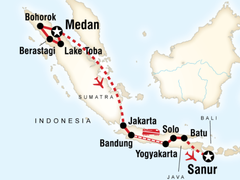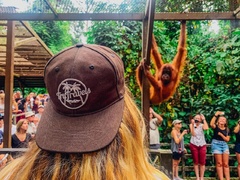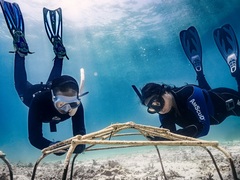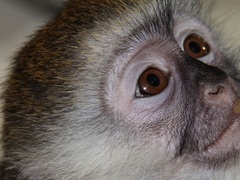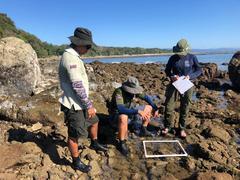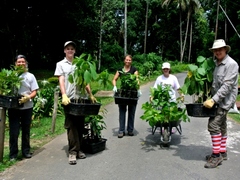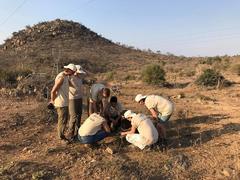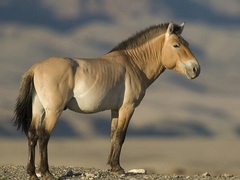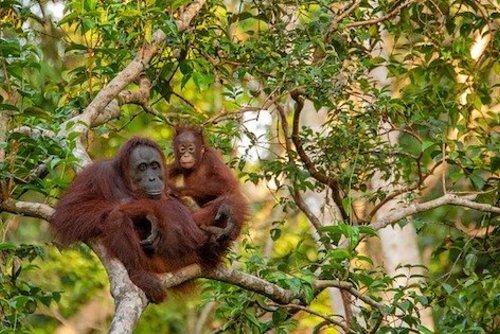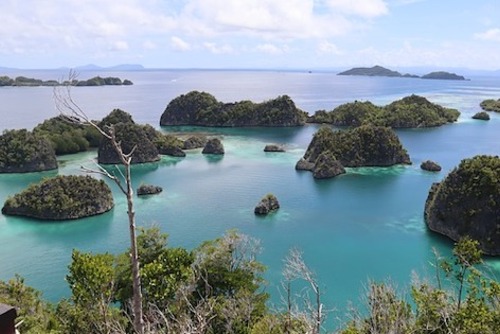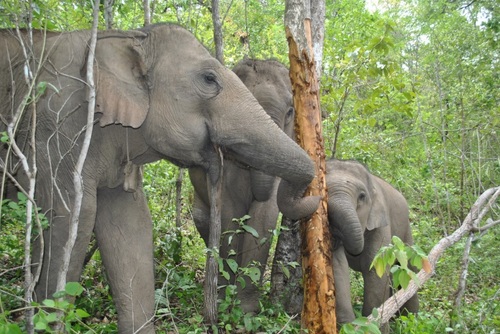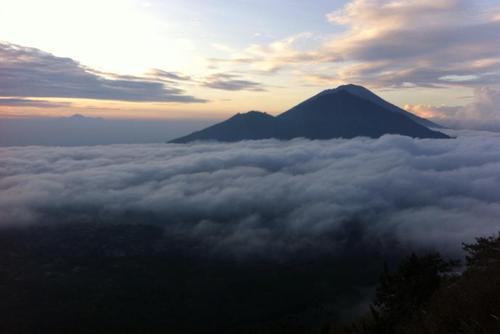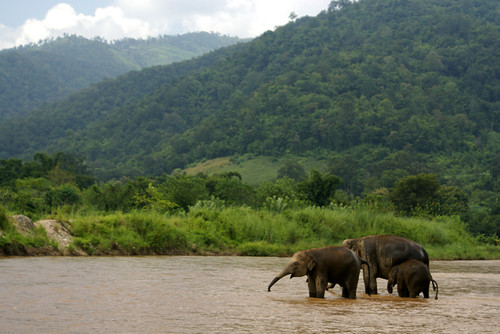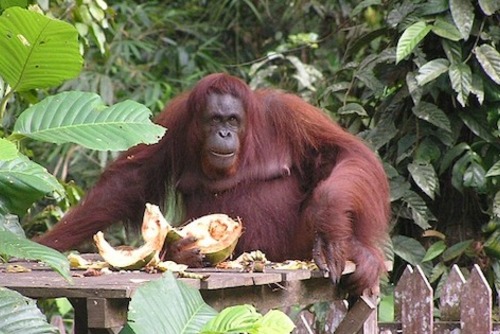By volunteering on this project, you will be contributing to the conservation of the orangutan and its unique ecosystem by improving our understanding of both, while helping find new cures for illness in the human and orangutan worlds.
Principal Investigator: MVDr Ivona Foitova PhD
Qualifications: Doctor of Veterinary Medicine, PhD in Wildlife Disease from Veterinary and Pharmaceutical University of Brno, Czech Republic, Europe
Affiliations: "UMI - Saving of Pongidae" Foundation
Project Title: Wild Orangutan Self-medication Strategies
Research Site: Leuser Ecosystem, North Sumatra, Indonesia
Rendez-vous site: 'Polonia International Airport' in Medan, North Sumatra, Indonesia
Cost: US $1,289 (excluding flights, insurance and tourist visa) / US $990 for students (excluding flights, insurance and tourist visa)
Team size: Minimum 2, maximum 6.
Your participation fee is used to cover all the day-to-day expenses of running the project, including food and accommodations for volunteers and staff, operation of the research station, lab equipment and supplies, and the funds necessary to transport faecal, plant, and soil samples abroad for important analysis work. We also pay the full cost of national park permits, at tourist rates. Any "leftovers" are invested in the future expansion of the project, including the building of an ambitious new research station in an area of forest previously unstudied. This area is home to a significant population of wild orangutans and the new station will go a long way to protecting their habitat while simultaneously providing a site for conservation education, summer schools and an expansion of research.
The project is proud to be able to provide important work for the local community and employs all local guides for trekking in the forest.
A SAMPLE volunteer schedule may go as follows:
Day 1:
Arrive in Medan, travel to project, orientation to location, rest and recuperate.
Day 2: Orientation to project and tasks, Explore the local area.
Day 3: Visit to orangutan feeding platform and forest intro trek, second visit to feeding or free-time.
Day 4: Research tasks at base (see below).
Days 5-10: Fieldwork with overnight stays in the forest carrying out tasks necessary to the project's research (see below). Three meals per day and water are provided and you will stay in the same, temporary camp each night.
Alternatively, several one-day treks in the jungle to carry out tasks necessary to the project's research (no overnight camping).
Day 11: Rest and recuperate.
Days 12: Field work data processing, Debriefing.
Day 13: Travel to Medan (AM) for afternoon flights.
IMPORTANT: the above is only an example of a possible schedule of activities. It is always subject to change based on the needs of the project. Staying overnight in the forest is not guaranteed and will be based on considerations such as weather, staff availability, number of volunteers, and most importantly, physical fitness of the volunteers.
Possible research tasks at base:
* Entering behavioural data collected by Field Assistants.
* Organising samples of orangutan foodstuffs and preparing for our herbarium.
* Organising faecal samples collected by Field Assistants.
* Preparing equipment for Field Assistants to go to the forest.
* Preparing behavioural data sheets.
* Preparing sample bottles for Field Assistants.
* Shopping for project supplies in town or at the local market
* Brainstorming ideas to help the project's promotion
* Keeping Temperature, Weather and Humidity data records updated
Possible research tasks in the forest:
* Nest counting to provide seasonally varying estimates of the orangutan population.
* Fruit trail transects to record the range of foodstuffs available to orangutans in an area.
* Locating areas with significant wild orangutan populations.
* Finding and following orangutans to collect behavioural data and faecal samples.
Volunteers on every team will get proper instruction and information about the following matters:
* The project and your role/responsibilities within it
* Safe behaviour in tropical countries, potential health risks and precautions
* Proper sample collecting techniques and data entry protocols
* Advice about the best clothing and equipment for work in the forest
* Local flora and fauna and especially the orangutans
* Indonesian culture, basic language, and appropriate behaviour in Sumatra
The most important fact - there will be absolutely NO physical contact with the orangutans. If you are hoping to come so that you can cuddle one of these amazing creatures, then I am afraid that this is not for you. This rule will be strictly enforced if necessary. We also cannot guarantee encounters with orangutans - our research focuses on wild orangutans and much of our work therefore takes place in areas where the orangutans themselves can be quite elusive, often staying high up in the canopy or travelling to other areas where more fruit is in season. This is the reality of wildlife fieldwork. However, should you be lucky enough to catch even a short glimpse of one of these graceful creatures in its natural habitat, the experience will certainly stay with you forever.
You will have free time to enjoy the beauties of the Indonesian culture and environment.
Being near a fast running river, rafting is available. This costs around U$15 for a half day. There is also "tubing" which is a cheaper option and lots of fun (less than $1/day to rent an inner-tube)! It is also possible to go for a longer walk to a smaller but deeper river for some swimming and perhaps a barbecue.
There are mountain bikes to rent at around US $4 a day, and most of the area is easily accessible to leisurely cruising by pedal power. If this isn't fast enough action for you, it's also possible to rent a motorbike (with or without driver) and go for a tour of the local area. There are a number of other rivers and waterfalls to be discovered and explored.
If you're worn out after all this, the local people are excellent at giving massages to those tired limbs, and the prices are very reasonable!
As you require a 30-day tourist visa to enter Indonesia and will be with the project for 13 days of this, you have an excellent opportunity to explore more of this incredibly diverse country. For a better idea of what is available, have a look at:
http://www.indonesia-tourism.com/
We run one team per month for 13 days (this can increase if interest is great). Minimum of two team members, maximum of six.
Accommodation is VERY basic, but clean. While staying at our base you will probably share accommodation with other volunteers, depending on the number of volunteers in your team. You will have a bed, a mosquito net, and a small "bathroom" with a basic Asian toilet (hole in the floor, which flushes when water is run through). You will be asked to clean yourself "Asian-style" using only water and your left hand after using the toilet, so as to avoid blockages caused by paper. There will be no shower, but a supply of cold water that you scoop over yourself to wash. All our base accommodation has electricity unless there's an outage, which often happens during heavy rain. There's a variety of insects and small animals around for you to get acquainted with - cats, geckos, mice, geese, cockroaches, leeches, chickens, spiders and a variety of nameless critters. While trekking you will be camping in the jungle for up to 4 nights at a time with only a tarpaulin and thin foam mat separating you from the forest floor. Food will be cooked over an open fire and water from a clean river nearby boiled to provide safe drinking water.
Meals will be taken three times a day. There is no menu, and the food will be basic Indonesian cuisine, which mainly consists of rice, noodles, vegetables, eggs and occasionally chicken/fish. It is simple, but also tasty, utilising varying amounts of chilli, but rarely without. Fruit is plentiful, and you won't find many places in the world with more variety. Vegetarians can easily be catered for.
Interested? Then drop us a line on orangutanhealth@nusa.net.id or ivona_foi@hotmail.com (emergency only) and we can supply you with further details.
If you would like to get in touch with previous volunteers, please email us at orangutanhealth@nusa.net.id for a contact list.
Orangutan Health
Country: Indonesia
The Orangutan Health Project (OHP), the first of its kind for orangutans, investigates the special behaviours and ecological conditions necessary to maintain health in wild orangutans.
Update Listing
Apply to update this profile.
Learn more about advertising opportunities or contact us for details.
Orangutan Health Reviews

Related Opportunities
Best of Sumatra & Java
- G Adventures
- Indonesia
- 2 weeks to 3 weeks
- 1250 to 1750 £ Pound (UK)
Borneo Adventure
- TruTravels
- Multiple Destinations
- 1 week to 2 weeks
- 1000 to 1500 £ Pound (UK)
Divemaster Internship in Indonesia
- Gili Shark Conservation
- Gili Islands Indonesia
- 2 weeks to 3 months
- 2000 to 3000+ $ Dollars (US)
Monkey Conservation Program, Kenya
- Colobus Conservation
- Kenya
- < 1 week to 1 Year+
- 100 to 2000 $ Dollars (US)
National Park Conservation & Plastic-Free Oceans
- Jamso Trainee GmbH
- Puntarenas
- 2 weeks to 6 months
- 250 to 3000+ $ Dollars (US)
Wildlife conservation volunteering in Borneo
- Oyster Worldwide
- Borneo
- 1 week to 2 weeks
- 1250 to 1500 £ Pound (UK)
Wildlife Volunteer in Greater Kruger National Park
- Hamba Africa
- Greater Kruger National Park
- 2 weeks to 4 weeks
- 1000 to 2000 £ Pound (UK)
Wild Takhi Research (Mongolia)
- Fronteering
- Tov Province,
- 1 week to 4 weeks
- 750 to 2500 $ Dollars (US)
Related Articles
Volunteer with Orangutans
Apply for the experience of a lifetime by joining a volunteer program at an orangutan sanctuary in Asia. There are c...
02/05/2013
Indonesia Backpacker Tours
Indonesia is a spectacular country and you can find trips for all interests, whether you want to discover ancient ruins,...
23/07/2019
Best Places to See Wildlife in Asia
Are you planning a trip to Asia? Would you like to see animals in their natural habiat and avoid unethical zoos and mari...
20/10/2017
Top 10 Experiences in South East Asia
South East Asia is such an amazing place to explore and there are so many sights to see.
30/03/2015
Best Animal Sanctuaries to Visit around the World
Are you passionate about wildlife conservation? Do you love a good excuse to travel? With so many depressing news sto...
18/02/2014
Borneo Backpacker Tours
By booking a tour to Borneo you will get to see amazing places and get a better understanding about the island and the p...
31/07/2019

